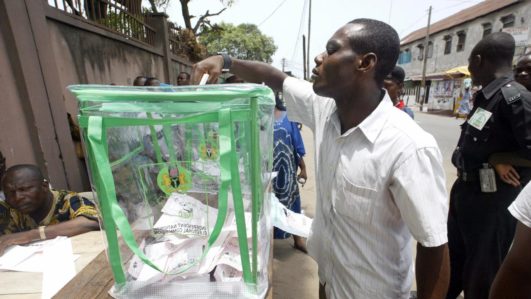Collation officers are no longer allowed to make or receive calls in the course of their collation duties, new regulations released by the Independent National Electoral Commission (INEC) has shown.
The provision was contained in a new 33-page regulations and guidelines for conduct of future elections in the country.
The new regulations read in part, “In order to remain focused on their assignment, collation officers are not allowed to make or receive telephone calls during collation.’’
Recall that receiving a call during collation of results of the Osun gubernatorial election of September 22, 2018 made many political observers accuse the Chief Returning Officer of unduly influencing the final declaration of results.
INEC also explained how polling officers are to handle cases of smart card reader and Permanent Voters Card (PVC) issues.
The electoral body said, “Where a voter’s PVC is read but his/her fingerprint is not authenticated, the APO I shall refer the voter to APO II who shall request the voter to thumbprint the appropriate box in the Register of Voters; request the voter to provide his/her phone number in appropriate box in the Register of Voters; continue with the accreditation of the voter; and refer the voter to the PO or APO (VP) for issuance of ballot paper(s).
“Where a voter’s PVC is read but the name of the voter is not on the Register of Voters, APO II shall refer the voter to the PO or APO (VP) who shall politely request the voter to leave the Polling Unit.
“In the event that the PVC fails to be read by the Smart Card Reader, the APO I shall refer the voter to the PO or APO (VP) who shall politely request the voter to leave the Polling Unit.
“Where a voter’s PVC is read and the SCR shows the details of another person, rather than the details of the cardholder as printed on the PVC, the APO I shall: Refer the voter to APO II to confirm that the details of the voter in the Register of Voters correspond to those on the PVC; APO II if satisfied that the holder of the card is on the Register of Voters, shall record the phone number of the voter in the appropriate box on the Register of Voters; and Proceed with the accreditation of the voter.”
“In all cases from 11(b) to 11(e) the Presiding Officer shall fill the appropriate forms in the PU booklet and make a report. Affected voters in 11(b) and 11(e) qualify to be issued ballot papers after consultation with Polling Agents.
“Where the Permanent Voters’ Card, PVC, presented by the voter is not for the Polling Unit, the APO I shall politely inform the voter and advise him/her to proceed to the appropriate Polling Unit.”
“Any person who presents the PVC of another person with an intention to use it to vote, shall not be allowed to vote and may be liable to arrest and prosecution.
“In the event of sustained malfunction of the Smart Card Reader (SCR), the Presiding Officer (PO) shall immediately inform the Supervisory Presiding Officer (SPO), the Electoral Officer (EO), and the Electoral Operations Support Centre (EOSC) for replacement; suspend Accreditation and Voting until a new Card Reader is made available;
“Telephones and other electronic devices capable of taking pictures are not allowed in voting cubicles. Voters may come to the Polling Unit with telephones and other electronic devices provided that they do not take them to the voting cubicles or take pictures of other voters while they are voting.
“After thumb printing the ballot, while still in the voting cubicle, the voter shall carefully fold the marked ballot paper in the same manner that the Presiding Officer had pre-folded the ballot before
issuing it to the voter and proceed to drop it in the appropriate ballot box. Additional ballot boxes will be provided where necessary.
“Presiding Officers shall place the ballot boxes not more than two meters away from the voting cubicle, in the direction of the Presiding Officers and away from the polling agents.
“After casting his/her ballot, the voter is free to remain within the vicinity of the Polling Unit to witness the sorting and counting of votes and the announcement of results, provided he/she is orderly.
“Where the total number of votes cast at a Polling Unit exceeds the number of registered voters in the Polling Unit, the result of the election for that Polling Unit shall be declared null and void, and a report in that regard shall be made to the collation officer.
“Similarly, where the total number of votes cast at a Polling Unit exceeds the total number of accredited voters, the outcome of the election shall be declared null and void, and a report in that regard shall made to the collation officer.
“Where after a crosscheck and recount, the sum of spoiled ballot papers, rejected ballots and valid votes is not equal to the total number of used ballots, an anomaly exists, and the Presiding Officer shall submit a written report to the RA/Ward Collation Officer.”
Read Also: (Full List): Arrested Lagos Cultist Identifies All Those He Has Killed

